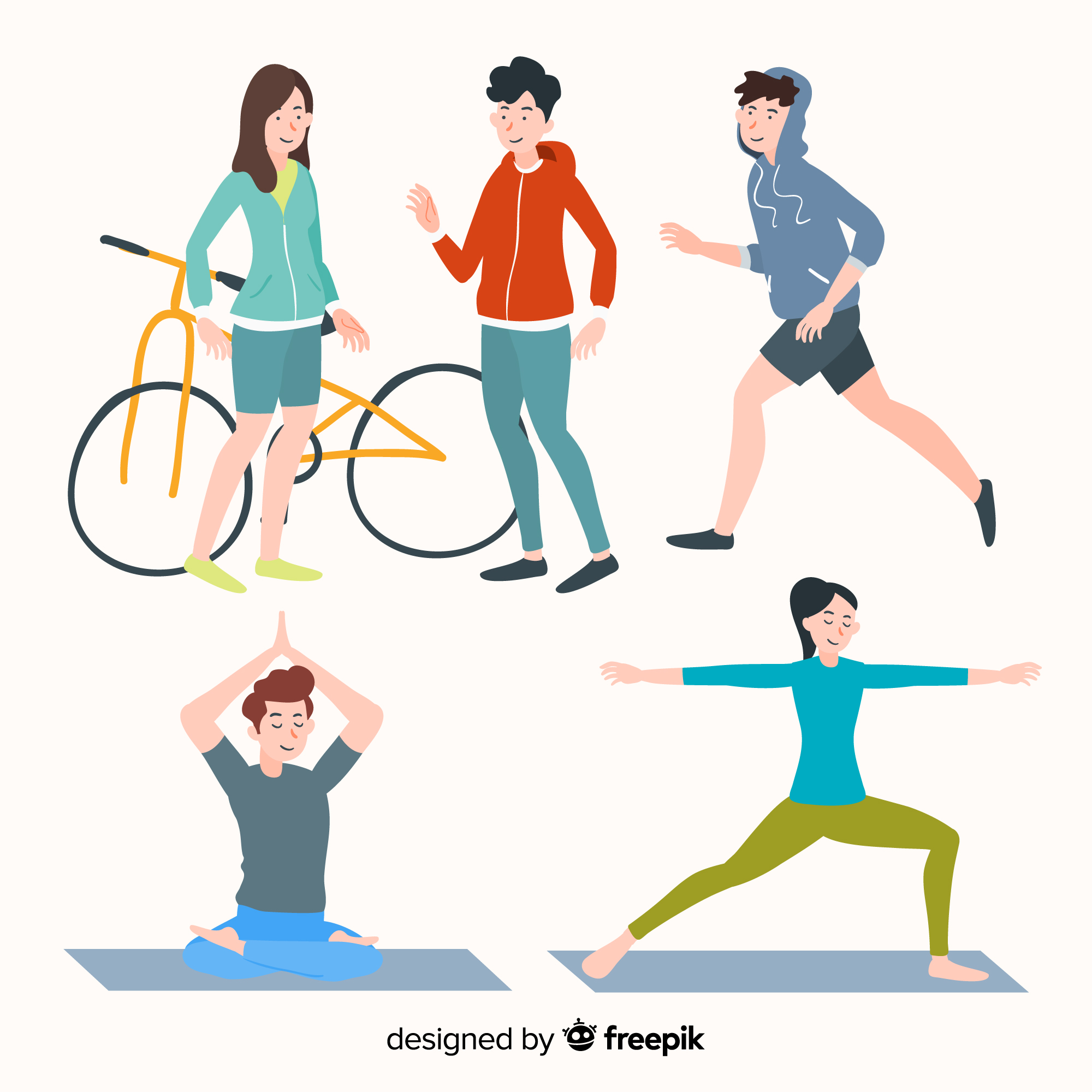
Become more vital with Recharge360
In the modern world where we are constantly faced with stress, deadlines and busy lifestyles, vitality is becoming increasingly important. At Recharge360, we believe vitality is the key to both personal well-being and professional success. Our goal is to help you and your team become more vital through our training and our programs. But what exactly does vitality mean, and how can we help you become more vital?
What is vitality?
A question we do get every day, "What exactly is vitality? The term "vitality" is derived from the Latin word "vita," which means life. According to the Dikke Van Dale, the meaning of vitality or 'vitaal' is also powerful and energetic. In summary, then, you can say that vitality literally means life force. Enough strength to cope with life.
Health and vitality have been hot & happening in recent years. You would also like to feel fit & vital, wouldn't you? But what exactly is vitality? Vitality is a beautiful word, but what exactly does it mean? If you google vitality you can't see the wood for the trees. And that's where we come in. We translate difficult vitality topics into understandable language. And preferably: concrete experience. Because of course you can talk and read about vitality for ages, but you want to experience your vitality. Experience for yourself how good you can feel, experience for yourself how much more focused you can be.
Many people argue that vitality and health are the same thing, but nothing could be further from the truth. Vitality is much broader and goes far beyond just your health. In addition to one's physical health or physical well-being, vitality is also about adequate relaxation, meaning and motivation. In business, this is also known as sustainable employability.


Why is vitality important?
For you, it's simple. When you feel vital, you have plenty of energy. You feel good and experience joy in your life. You are comfortable in your own skin. Maybe not every day and always, but generally you feel happy with yourself and your life.
Four reasons why vitality matters:
- Improved productivity: A vital team performs better. Energetic and healthy employees can concentrate better and are more productive.
- Less absenteeism: Healthy employees are less likely to call in sick, leading to less absenteeism and lower costs for the company.
- Positive Work Culture: Vitality contributes to a positive work culture. Employees who feel good about themselves are more engaged, motivated and work better together.
- Creativity and Innovation: Healthy and happy people are often more creative and innovative. Vitality stimulates fresh ideas and new perspectives.
Vitality in numbers: what does the research say?
Recent studies highlight the importance of workplace vitality. Here are some notable statistics and research findings:
Productivity and vitality:
- TNO research shows that vital employees are on average 18% more productive than their less vital colleagues.
- A University of Warwick study showed that happy employees are 12% more productive.
Sick leave:
- According to CBS, the average sick leave rate in the Netherlands in 2023 was 4.7%.
- Companies with active vitality policies report up to 25% less sick leave (source: RIVM).
Burnout and stress:
- The National Survey of Working Conditions (NEA) reported that in 2022, 17% of workers experienced burnout symptoms.
- 36% of workers report that work is the main source of stress in their lives (source: Stress Barometer).


Why should you encourage vitality as an employer?
We all know that vital employees make for a vital organization. Employees who pay attention to their own vitality have great mental resilience, or good mental health.
A vital person is more comfortable in their own skin, is a fun colleague, is more productive and takes less time off work. This, of course, has a positive impact on your overall bottom line. As we wrote earlier in this article, there are four dimensions of a vital life. It is also about meaning and spirituality. In short, it is about the degree to which a person has energy to perform optimally in life. Employers are therefore increasingly investing in vitality programs and activities. Furthermore, vitality also contributes to the overall amplification of your organization. Amplition means strengthening and increasing positive aspects, such as talents and well-being.
Also check out our podcast and find out how insights from Formula One and the Marine Corps can help improve team dynamics and leadership development within your organization.
Why then do many vitality programs still fail?
For OHRA, we recently examined the most common reasons why vitality programs (often) don't get off to a good start.
We received the following 10 reasons most often when questioned by clients and from a survey of HR/ vitality managers.
In no particular order:
- Tone of voice does not match target audience
- Clear objective and its measurement is lacking.
- Stakeholders are not involved (we often find that far too many stakeholders are involved, because everyone has an opinion on vitality or knows someone who could be involved, which slows down progress enormously).
- There was no survey of employees - what do they themselves see as solutions?
- Minimal promotion (or barely findable at all in all internal channels).
- Poor preparation/ initiated too quickly/ everything had to be finished yesterday.
- One provider/solution was chosen, but one size doesn't fit all.
- Everyone is too busy, no time.
- Behavior change requires consistency in approach, time and narrative.
- Minimal budget.
4 tips to get and stay vital that you didn't already know
Are you not feeling quite vital and would like to become and stay vital? Be energetic, smile and enjoy life? And what can you do to feel more vital? We would like to give you the following tips that you can start using right away.
Tip 1: Micromeditations
Take 2 minutes an hour for micro-meditations. Close your eyes, breathe in and out deeply, and reset your mental focus.
Tip 2: Morning light ritual
Start your day with 10 minutes of direct morning sunlight to optimize your circadian rhythm and increase your daytime energy.
Tip 3: Sing your day energetically
Singing, even briefly, increases your mood and oxygen intake, which improves your overall energy and vitality.
Tip 4: Cold-water face dip
Dip your face in cold water for 30 seconds every morning to activate your nervous system and increase your alertness immediately.
5 general tips to get and stay vital
Tip 1: Eliminate stress
Often the best way to reduce stress is to eliminate stressors from your life. Otherwise, you are more concerned with symptom management, and that only helps in the short term and not for the long term.
Look closely at what you can influence and take action on it. If you can't influence it, then perhaps you can reduce it so that it doesn't bother you as much. And if it doesn't affect you at all, then it's better to accept it. Research shows that your resilience and well-being improves when you accept things and let them go.
Tip 2: Get social support from friends or colleagues
Talk to friends or colleagues or ask them for help. After all, you can't do everything by yourself and people are happy to help! You just have to ask. Whether at work or in your personal life. People generally find that difficult. It is often not in their personality and they prefer to rely on their perseverance.
If you don't ask, people don't know you could use help. They can't just read your mind. So step over the threshold, you'll see that it's really not too bad and can save a lot!
Tip 3: Eat healthy
Provide your body with proper nutrition. This is important for it to work efficiently and respond well to stressors. Make sure you have three full meals a day and avoid sugary snacks. For example, low blood sugar can lead to anxiety and irritability, while high blood sugar can lead to a crash that results in low energy and fatigue. Think of the after lunch dip we are all familiar with.
When you don't eat healthy, you stress your body, putting energy toward digesting our meal, when we want to use that energy for other things.
Tip 4: Sleep well
Sleep is an understudy in the topic of vitality. It is the basis of feeling vital. During sleep, your body and mind recover. You also process all your emotions. Research shows that even one night of poor sleep negatively affects your ability to think, act, make decisions and solve a problem. If you think about this, you can figure out for yourself what the consequences are both in the short term, but especially in the long term.
An average person needs at least six hours of sleep and preferably between seven and nine hours of sleep per night. So make sure you know how much sleep you need. You will be so much more mentally resilient to stress. Read more about sleeping well
Tip 5: Get plenty of exercise
Getting enough exercise is not only good for your fitness, but it also helps reduce your stress. So both physically and mentally, it makes you stronger. There are several reasons why exercise lowers your stress level:
- Factor 1: This has partly to do with your hormones. When you exercise, endorphins or happiness hormones are released. These hormones cause the body to relax and they make you happy.
- Factor 2: It has been scientifically proven that people who exercise and exercise enough have lower anxiety and stress symptoms than those who do not. Yoga is also a good form that may fall under sports. Yoga is a natural and healthy form of exercise where you put less stress on the body. "Studies have shown that just a little yoga in the morning, in the evening or even during your lunch break can reduce stress and increase your productivity."
- Also read: Benefits of exercise


Connection between physical activity and cognitive performance:
Recent research has shown a strong correlation between regular exercise and improved cognitive performance. People who engage in moderate-intensity exercise at least three times a week often show better results in terms of problem-solving, memory and concentration ability. These effects are not limited to young people; older people also benefit significantly from physical activity.
The role of nutrition in mental health:
Research increasingly emphasizes the influence of diet on mental health. Diets rich in omega-3 fatty acids, antioxidants, and fiber have been associated with a lower risk of depression and anxiety disorders. Moreover, a diet rich in vegetables, fruits, whole grains, and healthy fats can improve overall mood and cognitive function.
The importance of rest periods during the workday:
Scientific studies suggest that taking short, regular breaks throughout the workday can significantly increase productivity. For example, employees who take a 10-minute break after every 90 minutes of work are better able to stay focused and perform complex tasks. This "ultradium cycle" is based on the body's natural rhythms and helps prevent fatigue.
Social connectedness as key to vitality:
Social connectedness is increasingly recognized as a crucial factor in vitality and well-being. People with strong social networks tend to be healthier and live longer. Social support can lower stress, strengthen the immune system and reduce the risk of chronic disease. In addition, involvement in community activities or volunteer work can contribute to a greater sense of meaning and satisfaction in life.
The impact of a healthy sleep environment:
In addition to the duration of sleep, the quality of the sleep environment is essential for optimal rest. Creating a sleep-friendly environment - such as a cool, dark room and avoiding electronic devices before bedtime - can significantly improve sleep quality. Research shows that a good sleep environment can help prolong REM sleep, which is crucial for emotional recovery and memory consolidation.
Conclusion: vitality as a foundation for success
Promoting vitality is not only a personal responsibility, but also a strategic business decision. As the above figures and tips show, vital employees have a direct impact on an organization's productivity, innovation, and overall success. Companies that invest in the vitality of their employees reap long-term benefits in the form of lower absenteeism, higher engagement, and a stronger work culture.
Recharge360 is ready to guide you towards a more vital and successful life, both personally and professionally. Whether you want to work on your own well-being as an individual or improve the vitality of your team as an organization, we offer the tools, insights and support you need to achieve your goals. Start your journey to a more vital life today!
Stronger team, stronger company
Stay up-to-date by signing up for our newsletter!


